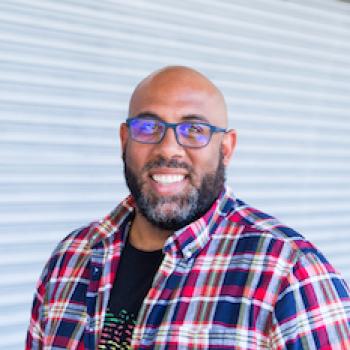Check out the first episode of Raci$m Is Profitable, a podcast by and for people of color that aims to dismantle the assumptions that fuel the oppression economy. The podcast is hosted by Jeremie Greer and Solana Rice, the co-founders and co-executive directors of Liberation in Generation Action. In this episode, they talk with Lauren Jacobs, Executive Director of PowerSwitch Action, to break down how work determines our worth. From the expectations of grind culture to an obsession with Black excellence, the oppression economy tells us that we’re only valued — and valuable — if we work hard and produce, produce, produce. Part of the same flawed belief system as personal responsibility, we’re expected to meet impossible standards determined by who you are, where you’re from, what job you have, and what systems you have access to.
Read an edited transcript below or check out the full episode here.
Jeremie Greer: There’s a scene from Fences — you know, the “Why don’t you like me?” scene, where the father is having this real conversation with his son about like, look, this is what it means to work and this is why we’re doing it. And a real — we have to do this to survive — message comes through. Did you get this sense [growing up] that work is a compulsory thing that we have to do to survive?
Lauren Jacobs: There’s two parts to this. There’s one about keeping a roof on your head, food on the table. But then there was the other side of it: the respectability piece, about proving our worth, proving our ability to be equal with white folks through how hard we work — never being late, always being impeccably dressed.
Solana Rice: How do you challenge this narrative around work as worth?
Jacobs: Well, I mean, this is a complicated thing because you’re trying to fight within the bounds of a system that’s just, from the roots up, not constructed to recognize our dignity and our value as precious lights and lives on this planet. People are working and they are producing wealth for “the economy” — by which I mean specific corporations and specific billionaires and rich folks. That work clearly has value because, if you didn’t need me, you would cut me in a heartbeat. So there’s fighting for the value that work is producing to be recognized. At PowerSwitch, we’re trying to also think about the future we really want. Like when we really breathe into “multiracial feminist democracy” — care and preciousness of people and a community centered view of how life should be lived and how communities could be structured. Then you start to think about, how am I fighting for the work people are doing right now to be recognized and compensated, but how am I also talking about: people don’t have to work in order to have roofs over their heads, to have food on their table, to have access to health care. Those are just things we owe each other as human beings on this planet.
Greer: You have to work. You gotta grind, you got to survive. And then there’s also this sense of like, yeah, but there’s this work that you shouldn’t be paid for; we’re not even gonna call it work. What are the ramifications of having to walk that contradiction every day?
Jacobs: How do you also throw in the work that people are doing that’s not even recognized? People are working all the time every day. It may not be a W2 job, but, you know, somebody is in their house doing hair. Somebody is selling surplus sneakers. Someone is the car guy in the neighborhood. So how do we also bring that into this conversation? This is also trying to get at some of the questions coming out, at the policy level, on Build Back Better and care sector jobs. People want to do work that feels like it’s making a difference and really contributing versus the grind.
Rice: Working constantly changes the way we show up; it changes the way we show up for family, it changes the way we show up in our communities. And it changes the way we show up politically. And what we think we deserve and don’t deserve as people. How do you see this idea that you’ve got to work your fingers to the bone impacting our political power?
Jacobs: After two, three generations of living under the terms as they are, and there you are, in the same place that your grandparents were, it can affect our sense of hope in the possibilities of transformation. I think that has real ramifications on political power. It is the question about folks turning out to vote; it is the question about folks believing that, you know, that regular folks can do that job and succeed in it.
Greer: And these things get built into systems. There isn’t a huge gulf between chattel slavery and compulsory work requirements for public benefits. How do we break through these systems that have reinforced the idea that you must work to have a roof over your head. You work or you die. How do we get past that?
Jacobs: Yeah, I mean, it is the question of the day. Here’s one area where the left and its relationship to faith leaders becomes important. Not so much from the monotheistic way of looking at things, but from the lens of speaking to values. If we could take this society all apart and reconstruct it in a different way, I do think people want to work. But I mean that in a different way: I don’t think it’s to work for somebody else’s wealth or benefit or to poison the environment and the rivers and the seas or to harm others. I think it’s that sense of, I’m contributing something. Thinking about the ways in which people — unpaid — are contributing to the sense of community and the betterment of neighborhoods, and then what’s compensated and what’s uncompensated… What would work look like if you were able to get [paid to do] those types of activities versus sending Jeff Bezos space?
Rice: Are you seeing glimmers of hope that this myth around work is crumbling?
Jacobs: I do think that we’re in a moment. And the challenge, I think, to all of us that want a different world is, how are we making haste while the sun is still shining? We’re in a moment of a surge. And so what are we doing during the surge? There’s a question about how to build organization and structure now that can tackle all these issues in the long term.


